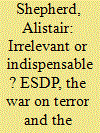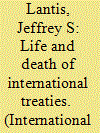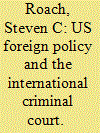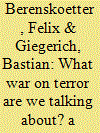|
|
|
Sort Order |
|
|
|
Items / Page
|
|
|
|
|
|
|
| Srl | Item |
| 1 |
ID:
070963


|
|
|
|
|
| Publication |
2006.
|
| Summary/Abstract |
In May 2003 the European Union declared its European Security and Defence Policy fully operational. Simultaneously the EU appeared terminally divided over the conflict in Iraq and transatlantic divisions were emerging over the conduct of the 'War on Terror'. Given the already contentious nature of ESDP, this paper explores whether post-September 11 developments will undermine the development of this policy. After analysing the status of ESDP the paper explores its utility in the post September 11 era and in light of the European Security Strategy. While, in European eyes, military force is not particularly applicable to the 'War on Terror', this paper will argue that there are a number of other ways in which an enhanced and redefined European military capacity can play a role in promoting stability and upholding international norms and values. Secondly, as security priorities change the internal and external security aspects of EU need to become more integrated. Ultimately, a clearly defined ESDP with the unwavering commitment of the member states will give the EU a constructive, effective and essential role within the new framework of security.
|
|
|
|
|
|
|
|
|
|
|
|
|
|
|
|
| 2 |
ID:
070958


|
|
|
|
|
| Publication |
2006.
|
| Summary/Abstract |
The ratification process for international treaties has become increasingly politicized in many democratic states. But while scholars have devoted attention to the negotiation of international agreements, few have studied ratification struggles that define the ultimate success or failure of international commitments. Fewer still have examined the dynamics of this process in comparative perspective. This article explores the politics of contemporary international treaty ratification processes across democratic regimes. Drawing on two-level game theory, I posit that the likelihood of ratification success is often a function of elite strategies for treaty ratification, regime type (which conditions executive-legislative relations), interest group pressure, and public opinion in the domestic political environment relative to international commitments. A structured, focused comparison of case studies analyzes experiences of the United States, Canada, and Germany in ratification struggles in the past decade. I conclude that the likelihood of successful treaty ratification across issue areas depends primarily upon executive strategies and regime type within certain scope conditions. These results provide evidence of ways that external-internal linkages can affect treaty ratification and suggest the need for greater attention to the development of scope conditions of international cooperation.
|
|
|
|
|
|
|
|
|
|
|
|
|
|
|
|
| 3 |
ID:
070972


|
|
|
|
|
| Publication |
2006.
|
| Summary/Abstract |
One major concern in the study of international economic sanctions is the potential problem of selection bias. Game-theoretical analyses assert that the private suggestion of sanctions could bring about the desired change in behaviour: sanctions are least likely to be imposed when they are most likely to be effective. If this were true frequently enough, the study of sanctions implemented by states (such as in the data developed by Hufbauer, Schott, and Elliott [HSE]) would provide an incomplete picture of the effectiveness of the sanctions approach. In this article, we adapt Boolean analytic techniques to estimate selection bias in the HSE data. This analysis yields evidence of selection bias - suggesting that we should reconsider existing empirical research based on those data. We conclude by considering research approaches that could capture the cases lost to selection bias in the HSE data.
|
|
|
|
|
|
|
|
|
|
|
|
|
|
|
|
| 4 |
ID:
070957


|
|
|
|
|
| Publication |
2006.
|
| Summary/Abstract |
Human security is commonly understood as prioritizing the security of people, especially their welfare and well-being, rather than that of states.1 Rather than examining human security as a measurable or specific condition, however, the focus here is how ideas of human security facilitate the way that Southern populations are understood, differentiated and acted upon by Northern institutions. Of special interest is how human security as a relation of governance has continued to evolve within the war on terrorism. This is explored, among other things, through interviews with a number of British-based NGOs and the Department for International Development. At the close of the 1990s, human security encapsulated a vision of integrating existing aid networks into a coordinated, global system of international intervention able to complement the efforts of ineffective states in securing their citizens. Compared to this more universalistic and Southern-oriented notion of human security, which had a place for independent aid agencies, the war on terrorism is refocusing developmental resources on those sub-populations, regions and issues regarded as important for homeland security
|
|
|
|
|
|
|
|
|
|
|
|
|
|
|
|
| 5 |
ID:
070970


|
|
|
|
|
| Publication |
2006.
|
| Summary/Abstract |
In July 2002 Spain and Morocco almost came to blows over a small island in the Strait of Gibraltar. Successive occupations of Parsley Island occurred during a protracted period of tension between the two countries. The sustained expansion of cooperation between the two countries in the 1980s and 1990s ultimately seemed to have failed to produce the regional stability that had been the prime objective of Spanish diplomacy. Increased interdependence between these Mediterranean neighbours had failed to deter them from resorting to pressure and military action. Theories of interdependence, though generally developed in relation to other contexts, suggest that Spanish-Moroccan relations were built upon too narrow an agenda, primarily economic, which failed to address 'difficult' aspects of the relationship, such as regime differences and historically based cultural tensions. Changes in the external relations priorities of the two states, both before and after 9/11, also contributed to the crisis, which was thus a product of changed circumstances as well as deficient strategy. Crisis resolution came through mediation by the United States following another CFSP failure for the EU, notwithstanding common Spanish-Moroccan commitment to the Euro-Mediterranean Partnership.
|
|
|
|
|
|
|
|
|
|
|
|
|
|
|
|
| 6 |
ID:
070959


|
|
|
|
|
| Publication |
2006.
|
| Summary/Abstract |
The United States has argued that its military personnel can and should be exempt from ICC investigation and prosecution, and that the ICC Statute should be revised accordingly. Advocates of the ICC have condemned this position by claiming that it undermines the morale of the ICC and is based on false legal and political pretenses. This article proposes a third way of strategic accommodation involving amendments to the ICC Statute that will serve as structured incentives to the U.S. to (re) sign and ratify the ICC Treaty. Such an arrangement will avert the need for special measures that would violate the integrity of the ICC Statute and build consensus within the Assembly of States Parties.
|
|
|
|
|
|
|
|
|
|
|
|
|
|
|
|
| 7 |
ID:
070966


|
|
|
|
|
| Publication |
2006.
|
| Summary/Abstract |
This article critically assesses Alistair Shepherd's conclusion that ESDP is of limited utility in the post-9/11 world. We argue that this view is flawed for three reasons: first, Shepherd's analysis rests on an American-centric interpretation of the 'war on terror', neglecting the fact that the European perspective of the current security environment, and how to deal with it, is quite different from the American one. Second, we contend that Shepherd neglects ESDP's development as a tool for both military and civilian crisis management, which leads him to, third, underestimate a variety of activities of the EU and member states aimed at addressing threats of terrorism and WMD proliferation. Building on this criticism, it is suggested that the issue of ESDP's 'relevance' should not, indeed cannot be measured by assessing its usefulness for an American-defined war on terror. Rather than asking what the EU can do for the US, we propose that the more substantial question is how the EU is equipped to address the threats of terrorism and WMD proliferation as they appear to Europeans.
|
|
|
|
|
|
|
|
|
|
|
|
|
|
|
|
|
|
|
|
|